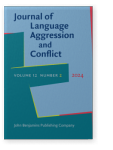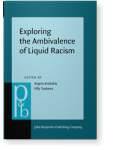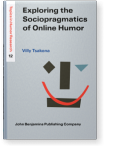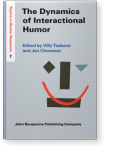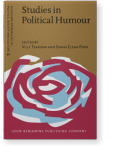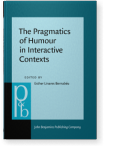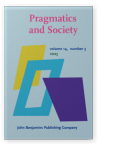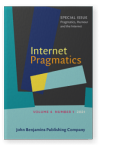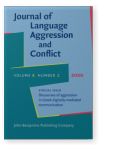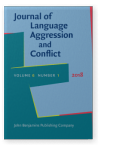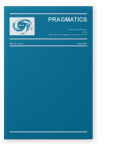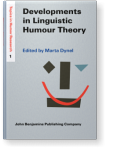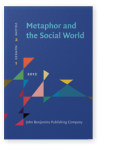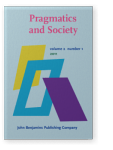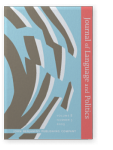Villy Tsakona
List of John Benjamins publications for which Villy Tsakona plays a role.
Journal
Exploring the Ambivalence of Liquid Racism: In between antiracist and racist discourse
Edited by Argiris Archakis and Villy Tsakona
[Pragmatics & Beyond New Series, 341] 2024. viii, 294 pp.
Subjects Discourse studies | Pragmatics
Exploring the Sociopragmatics of Online Humor
Villy Tsakona
[Topics in Humor Research, 12] 2024. xi, 264 pp.
Subjects Discourse studies | Humor studies | Pragmatics | Sociolinguistics and Dialectology
The Dynamics of Interactional Humor: Creating and negotiating humor in everyday encounters
Edited by Villy Tsakona and Jan Chovanec
[Topics in Humor Research, 7] 2018. vi, 316 pp.
Subjects Discourse studies | Humor studies | Pragmatics
Studies in Political Humour: In between political critique and public entertainment
Edited by Villy Tsakona and Diana Elena Popa
[Discourse Approaches to Politics, Society and Culture, 46] 2011. x, 290 pp.
Subjects Communication Studies | Discourse studies | Pragmatics
2024 Chapter 9. A migrant’s public apology as an instance of internalized racism: A Greek case study Exploring the Ambivalence of Liquid Racism: In between antiracist and racist discourse, Archakis, Argiris and Villy Tsakona (eds.), pp. 225–252 | Chapter
The aim of this chapter is to investigate how racio-national discourse influences the way migrants perceive themselves and frame their trajectories in the host community. Within a CDA framework, we analyze an article written by a young migrant and published in a Greek newspaper of leftwing and… read more
2024 Chapter 1. Antiracist and racist discourse as antagonistic and overlapping Exploring the Ambivalence of Liquid Racism: In between antiracist and racist discourse, Archakis, Argiris and Villy Tsakona (eds.), pp. 1–40 | Chapter
This editorial presents the theoretical background underpinning all the chapters of the volume, which are part of a research project aiming at identifying the ways racist discourse infiltrates antiracist discourse. More specifically, it elaborates on the concepts of discourse, racist discourse,… read more
2023 “The girl is on fire!”: Interactional humour in YouTube comments on the Notre Dame disaster The Pragmatics of Humour in Interactive Contexts, Linares Bernabéu, Esther (ed.), pp. 87–107 | Chapter
The article deals with online interactional humour in user comments on YouTube. Drawing on an extensive dataset of verbal reactions to a video discussing the (in)appropriateness of joking about the 2019 burning of the Notre Dame cathedral in Paris, the analysis traces how online commenters… read more
2023 Deconstructing imagined identities and imagined communities through humor: Evidence from adult L2 learners’ humorous narratives Pragmatics and Society 14:3, pp. 461–483 | Article
The aim of this study is to explore humor as a means for deconstructing identities in humorous narratives written by adult L2 learners. Norton Pierce’s (1995) notions of investment in L2 learning, imagined identities, and imagined communities as well as the concepts of script opposition and… read more
2021 Greek migrant jokes online: A diachronic-comparative study on racist humorous representations Pragmatics, Humour and the Internet, Yus, Francisco (ed.), pp. 28–51 | Article
This study adheres to critical humor studies investigating how humor targeting the migrant ‘Other’ may reproduce social inequalities in the form of racist stereotypes. We examine two datasets of online migrant-targeting jokes from two different time periods in Greece. Our first collection of… read more
2020 Liquid racism in the Greek anti-racist campaign #StopMindBorders Discourses of aggression in Greek digitally-mediated communication, Hatzidaki, Ourania and Ioannis E. Saridakis (eds.), pp. 232–261 | Article
This study examines the opaque reproduction of racism in an online, anti-racist campaign officially aiming to denounce hate speech and challenge widespread stereotypes concerning migrants. In particular, we investigate the video clips of the #StopMindBorders campaign launched by the Greek branch… read more
2018 A critical literacy proposal for exploring conflict and immigrant identities in the classroom: Or how not to sweep conflict under the multicultural classroom carpet Journal of Language Aggression and Conflict 6:1, pp. 1–25 | Article
In this paper we intend to show that conflict emerging from multiple and competing perspectives on social reality, may not necessarily be avoided in class, but it could instead become the starting point of critical discussions among teachers and students. To this end, we focus on the… read more
2018 Chapter 1. Investigating the dynamics of humor: Towards a theory of interactional humor The Dynamics of Interactional Humor: Creating and negotiating humor in everyday encounters, Tsakona, Villy and Jan Chovanec (eds.), pp. 1–26 | Chapter
While semanticopragmatic approaches to humor usually view it as stemming from incongruity, many current studies from fields such as discourse analysis, conversation analysis, and pragmatics have moved beyond to underline the significance of other factors defining humor. These factors include the… read more
2018 Chapter 10. Online joint fictionalization The Dynamics of Interactional Humor: Creating and negotiating humor in everyday encounters, Tsakona, Villy and Jan Chovanec (eds.), pp. 229–256 | Chapter
Genres are dynamic discoursal structures which are frequently subject to change so as to adapt to speakers’ new communicative goals and exigencies. The present paper explores the particularities of a quite recent genre of humor, online joint fictionalization, which seems to have emerged from oral… read more
2015 “The doctor said I suffer from Vitamin € deficiency”: Investigating the multiple social functions of Greek Crisis jokes Pragmatics 25:2, pp. 287–313 | Article
Research on political jokes has more often than not concentrated on their content, which is related to, and interpreted in view of, the sociopolitical events and contexts that have given rise to the jokes investigated each time. The present study intends to suggest that there are other aspects of… read more
2013 Okras and the metapragmatic stereotypes of humour: Towards an expansion of the GTVH Developments in Linguistic Humour Theory, Dynel, Marta (ed.), pp. 25–48 | Article
The study aims at bridging the theoretical and analytical gap between sociocultural approaches to humour and linguistic-pragmatic ones by proposing an expansion of the General Theory of Verbal Humour. It is suggested that the theory could gradually be transformed from a theory of the speaker to a… read more
2012 The Greek state and the plaster cast: From the Greek military junta of 21 April 1967 to the IMF and EU’s rescue mechanism Metaphor and the Social World 2:1, pp. 61–86 | Article
The study investigates the main aspects and the ideological function of the state is a sick person metaphor which was frequently used in the public speeches of the Greek dictator George Papadopoulos and which became emblematic of his regime. A specific variation of the metaphorical imagery, namely… read more
2011 Chapter 3. Informal talk in formal settings: Humorous narratives in Greek parliamentary debates Studies in Political Humour: In between political critique and public entertainment, Tsakona, Villy and Diana Elena Popa (eds.), pp. 61–81 | Article
Rather than a one-to-one correspondence between varieties and contexts, hybridity is often observed in communicative settings due to the plurality of sociolinguistic resources speakers draw upon to shape the particular style of talk which will best serve their communicative intent. This seems to be… read more
2011 Chapter 11. Postscript: A final (?) note on political humour Studies in Political Humour: In between political critique and public entertainment, Tsakona, Villy and Diana Elena Popa (eds.), pp. 271–278 | Article
Political humour is employed to define the boundaries between opposing political groups and to express discontent against politicians and political acts. The sociopolitical context of its production and circulation not only influences its form, content, functions, and targets, but also determines… read more
2011 Irony beyond criticism: Evidence from Greek parliamentary discourse Pragmatics and Society 2:1, pp. 57–86 | Article
Taking into account recent pragmatic and sociolinguistic approaches to irony, the present study investigates irony as a discursive resource Greek parliamentarians employ to fulfill their institutional roles and to negotiate verbal rules of conduct in highly institutionalized and confrontational… read more
2011 Chapter 1. Humour in politics and the politics of humour: An introduction Studies in Political Humour: In between political critique and public entertainment, Tsakona, Villy and Diana Elena Popa (eds.), pp. 1–30 | Article
In this chapter, the authors offer a working definition of political humour and summarise its main aspects as discussed in the relevant literature: the genres where political humour surfaces or dominates; the reasons why political criticism is so often encoded in humorous terms; and the… read more
2009 Parliamentary discourse in newspaper articles: The integration of a critical approach to media discourse into a literacy-based language teaching programme Journal of Language and Politics 8:3, pp. 359–385 | Article
The present paper aims, first, at analysing how and why parliamentary debates are transformed into newspaper articles with a narrative-like format; and, second, at proposing a model for integrating this kind of material and analysis into a literacy-based language teaching programme. Our data… read more
